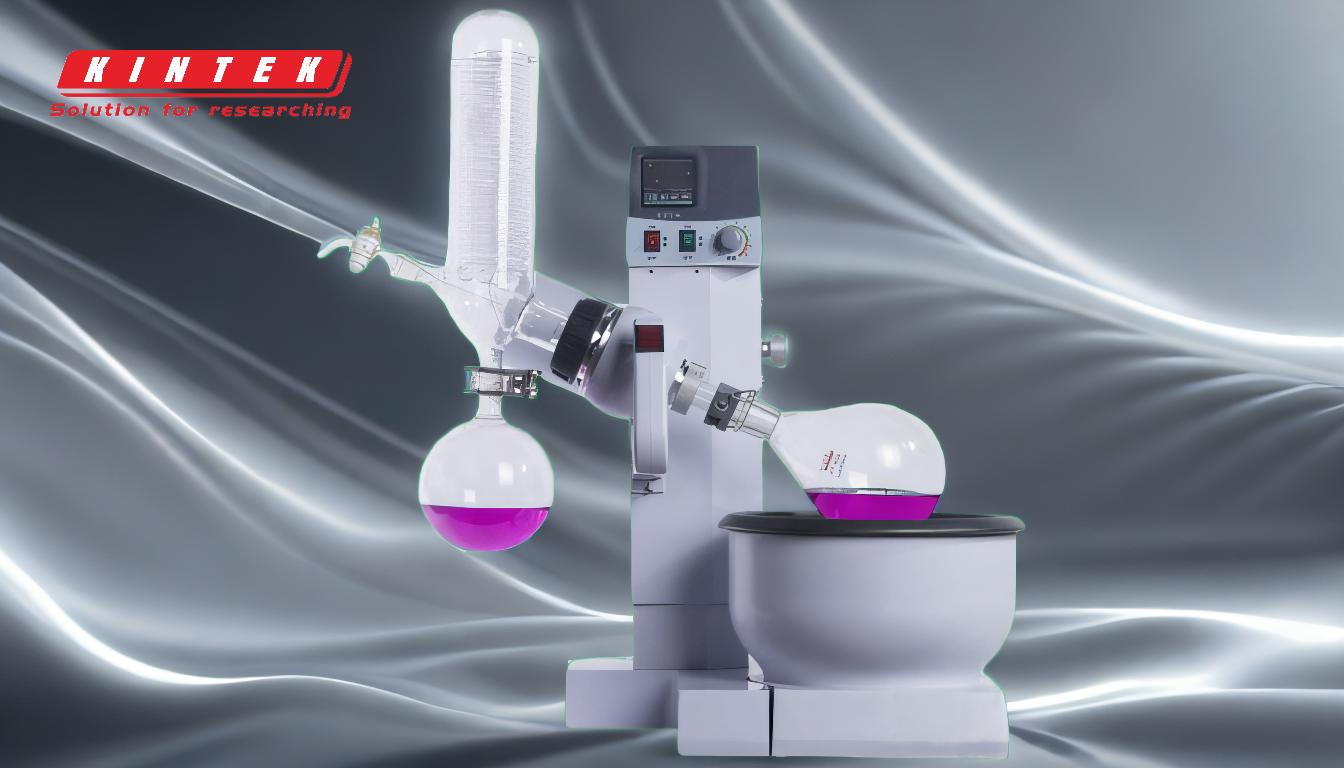Rotary evaporators, or rotovaps, are widely used in laboratories and industries for tasks such as concentration, drying, separation, and solvent recovery. They offer numerous benefits, including high efficiency, precise temperature control, energy savings, and suitability for handling heat-sensitive materials. By rotating the flask, a thin film of liquid is formed, increasing the surface area for faster evaporation. The solvent vapor is condensed and recycled, making the process environmentally friendly. Rotovaps are particularly advantageous for biological and chemical applications due to their ability to operate at lower temperatures, reducing the risk of thermal degradation. Their compact design, ease of use, and versatility make them indispensable in research and production settings.
Key Points Explained:

-
High Evaporation Efficiency
- The rotating flask creates a thin liquid film on its inner surface, significantly increasing the heated area and accelerating evaporation.
- This method is especially effective for removing large volumes of solvent quickly, often in less than 5 minutes.
- The increased surface area also reduces the risk of bumping (sudden, violent boiling), which can lead to sample loss or contamination.
-
Lower Operating Temperatures
- Rotary evaporators operate under reduced pressure, allowing solvents to evaporate at much lower temperatures compared to boiling at atmospheric pressure.
- This feature is crucial for handling heat-sensitive materials, such as biological products, which may degrade or decompose at higher temperatures.
- Lower temperatures also minimize energy consumption, making the process more sustainable.
-
Energy Efficiency
- The reduced pressure and lower operating temperatures result in significant energy savings compared to traditional boiling methods.
- The system recycles solvent vapor through a high-efficiency glass condenser, further enhancing its energy efficiency.
- This makes rotovaps an environmentally friendly choice for solvent removal and recovery.
-
Versatility in Applications
- Rotary evaporators are suitable for a wide range of tasks, including concentration, crystallization, drying, separation, and solvent recovery.
- They are ideal for both laboratory research and industrial production, particularly in fields like chemistry, pharmaceuticals, and biotechnology.
- Their ability to handle trace components and perform reflux operations adds to their versatility.
-
Precise Temperature Control
- Rotovaps are equipped with thermostatic heating systems, allowing for precise control of the evaporation temperature.
- This precision ensures consistent results and reduces the risk of overheating or damaging sensitive materials.
- Accurate temperature control is essential for applications requiring strict process conditions.
-
Compact and User-Friendly Design
- Modern rotary evaporators feature compact structures, making them easy to integrate into laboratory setups.
- Built-in lifting motors automatically raise the flask above the heating pot when the power is turned off, enhancing safety and convenience.
- Improvements in design, such as leakproofness and humanization, make them reliable and easy to operate.
-
Environmental and Economic Benefits
- The ability to recover and recycle solvents reduces waste and lowers operational costs.
- By minimizing solvent loss and energy consumption, rotovaps contribute to more sustainable laboratory practices.
- Their long service life and low maintenance requirements further enhance their cost-effectiveness.
-
Suitability for Heat-Sensitive Materials
- The combination of reduced pressure and lower temperatures makes rotary evaporators ideal for processing biological and chemical samples that are prone to thermal degradation.
- This capability is particularly valuable in pharmaceutical and biotechnology applications, where preserving the integrity of sensitive compounds is critical.
-
Efficient Solvent Removal
- Rotary evaporators are highly effective at removing residual solvents, even in trace amounts, due to the use of low pressure.
- This ensures that the final product is free from unwanted solvent residues, which is essential for quality control in research and production.
-
Improved Safety and Observation
- The design of rotary evaporators allows for easy observation of the evaporation process, enabling operators to monitor progress and make adjustments as needed.
- Safety features, such as automatic flask lifting and leakproof construction, reduce the risk of accidents and contamination.
In summary, rotary evaporators offer a combination of efficiency, precision, versatility, and safety, making them indispensable tools in modern laboratories and industries. Their ability to handle heat-sensitive materials, recover solvents, and operate at lower temperatures ensures high-quality results while minimizing environmental impact and operational costs.
Summary Table:
| Feature | Benefit |
|---|---|
| High Evaporation Efficiency | Accelerates solvent removal with increased surface area, reducing bumping. |
| Lower Operating Temperatures | Ideal for heat-sensitive materials, minimizing thermal degradation. |
| Energy Efficiency | Reduces energy consumption and supports sustainable practices. |
| Versatility | Suitable for concentration, drying, separation, and solvent recovery. |
| Precise Temperature Control | Ensures consistent results with accurate thermostatic systems. |
| Compact Design | Easy to integrate into labs with user-friendly and safe features. |
| Environmental Benefits | Recycles solvents, reducing waste and operational costs. |
| Safety Features | Includes automatic flask lifting and leakproof construction for safety. |
Enhance your lab's efficiency with rotary evaporators—contact us today to learn more!












